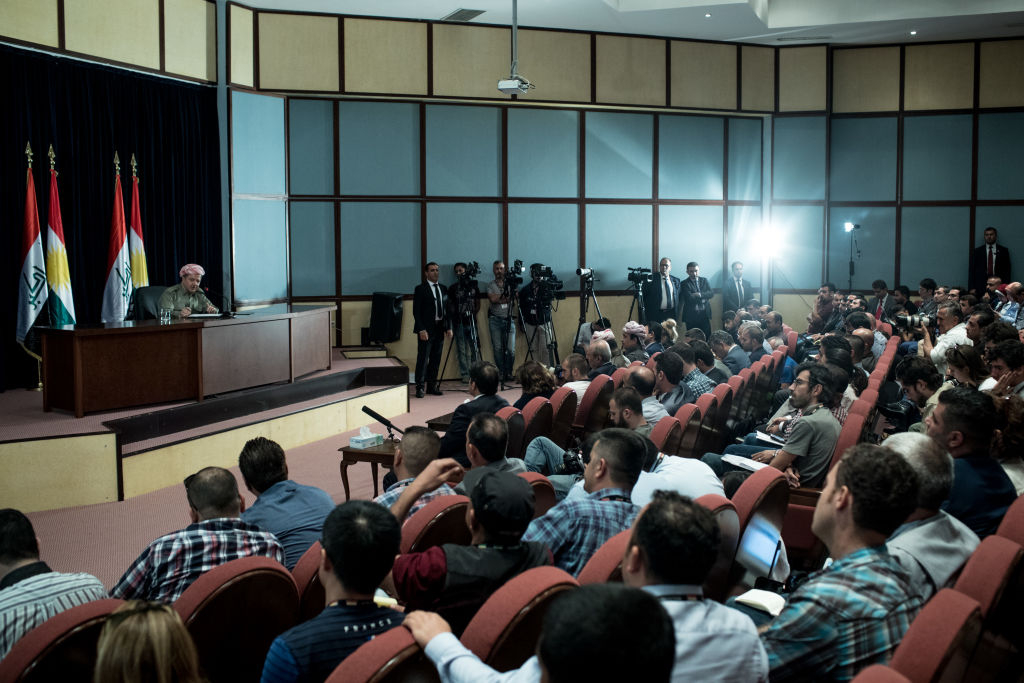by John R. Bolton
Iraqi Kurdistan's recent referendum on whether to declare independence from Baghdad garnered only slight attention in the U.S. Even the overwhelming vote (93 percent favored independence) and America's long involvement in the region did not make the story more prominent.Kurdish independence could well promote greater Middle Eastern security and stability than the collapsing post-World War I order.
Nonetheless, we would be badly mistaken to underestimate its importance for U.S. policy throughout the Middle East.
Protecting American interests in that tumultuous region has never been easy. Not only does Iran's nuclear-weapons threat loom ever larger, but the struggle against terrorism, whether from Hezbollah, ISIS, al-Qaida or any number of new splinter groups, seems unending.
Less visible but nonetheless significant forces are also at work. Existing state structures across the Middle East are breaking down and new ones are emerging, exacerbating the spreading anarchy caused by radical Islamic terrorism. Non-ideological factors such as ethnicity and cultural differences are enormously powerful and best understood as movements in the region's "tectonic plates," stirring beneath the surface of the more apparent threats of terrorism and nuclear proliferation.
None of these tectonic plates has more immediate implications for America's Middle East policy than the Kurdish people's long-standing determination to have their own nation-state. Modern-era Kurdish aspirations for statehood emerged during the Ottoman Empire's post-World War I collapse, as European powers redrew the region's map. The Kurds were unsuccessful in pressing their case, however, and their lands were split among Turkey, Iraq, Iran and Syria.
Nonetheless Kurdish longing for a separate state never dissipated, leading to considerable conflict, most visibly in Turkey. The West largely was unsympathetic in recent years because separatists in Turkish Kurdistan channeled their major efforts through the Marxist Kurdistan Workers' Party. Obviously, during the Cold War, Washington and the West generally had no interest in weakening Turkey and its critical geostrategic role as NATO's southeast anchor against Soviet adventurism.
Outside Turkey, however, especially in Iraq, Kurds played a much more constructive role, helping the United States in both Persian Gulf wars.
Iraqi Kurdistan became de facto independent from Saddam Hussein's Iraq in 1991, protected by the U.S-led operation known as "Northern Comfort," which included massive humanitarian assistance and a no-fly zone over northern Iraq. Saddam's 2003 overthrow opened the prospect of reunifying the country, but Iranian subversion, using Iraq's Shia majority to turn the country into its satellite, refueled Kurdish separatism.
Iraq's Sunni Arabs were also unwilling to be ruled by a Baghdad regime dominated by Shia adherents, who were little more than Iranian puppets. The rise of ISIS in Iraq occurred in part from this hostility, just as in Syria, ISIS capitalized on the anti-Assad feelings of Sunni Arabs, who felt excluded and oppressed by the dominant Alawite elite in Damascus.
With the destruction of the ISIS caliphate in Syria, the question of what comes next is unavoidably before us. The United States needs to recognize that Iraq and Syria as we have known them have ceased to exist as functioning states. They are broken and cannot be fixed.
This disintegration reflects the Middle East's broader, spreading anarchy, and it provides the context for Kurdish Iraq's overwhelming support for independence from Baghdad.
I have previously suggested that disaffected Sunni Arabs in Iraq and Syria might combine to form their own secular (but religiously Sunni) state, which the Gulf Arabs could help support financially. Indeed, while substantial issues remain about allocating the Iraqi cities of Mosul and Kirkuk between Kurds and Arabs, the Kurds themselves are largely Sunni, which suggests considerable confluence of interest with their Arab fellow Sunnis. Helping a new Kurdistan and a new Sunni state might overcome the current split among the Arabian peninsula's oil-producing monarchies and focus their attention on Iran, the real threat to their security.
Unfortunately, but entirely predictably, our State Department opposed even holding the referendum and firmly rejects Kurdish independence. This policy needs to be reversed immediately, turning U.S. obstructionism into leadership. Kurdish independence efforts did not create regional instability but instead reflect the unstable reality.
Independence could well promote greater Middle Eastern security and stability than the collapsing post-World War I order.
Recognizing that full Kurdish independence is far from easy, these issues today are no longer abstract and visionary but all too concrete. This is no time to be locked into outdated strategic thinking.

Pictured:
Kurdistan Regional Government (KRG) President Masoud Barzani speaks to
the media at a press conference on September 24, 2017 in Erbil, Iraq.
President Barzani announced that the referendum will go ahead as
planned. The KRG held an independence referendum on September 25. (Photo
by Chris McGrath/Getty Images)
|
John R. Bolton, former U.S. Ambassador to the United Nations, is Chairman of Gatestone Institute, a senior fellow at the American Enterprise Institute, and author of "Surrender Is Not an Option: Defending America at the United Nations and Abroad".
Source: https://www.gatestoneinstitute.org/11134/kurdistan-independence
Follow Middle East and Terrorism on Twitter
Copyright - Original materials copyright (c) by the authors.
No comments:
Post a Comment